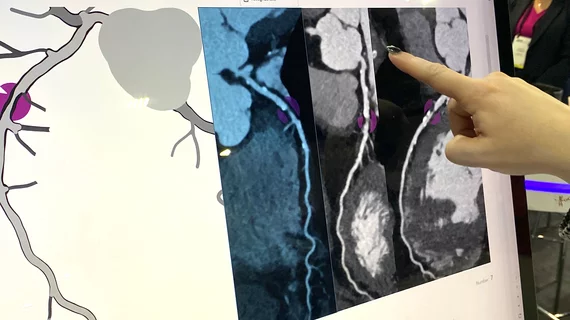HeartFlow sharing new data on AI-enabled CAD management at TCT 2024
HeartFlow, a healthcare technology company known for its non-invasive artificial intelligence (AI) technologies, has announced a busy schedule for the upcoming TCT 2024 conference in Washington, D.C.
The California-based company’s biggest announcement will focus on new seven-year data from the ADVANCE-DK study, a subanalysis of the larger ADVANCE registry evaluating HeartFlow’s FFRCT and Plaque Analysis offerings in clinically stable, symptomatic coronary artery disease (CAD) patients.
“The ADVANCE registry helps us better understand whether more complete revascularization, as defined by FFRCT, is associated with improved long-term cardiovascular outcomes,” Campbell Rogers, MD, chief medical officer of HeartFlow, said in a prepared statement. “Three-year data from this registry confirmed that patients with both abnormal FFRCT and high plaque burden had two-and-a-half to three times greater risk of adverse cardiac events compared to patients with only abnormal FFRCT or high plaque volume. We are excited to present seven-year data and build on our body of evidence demonstrating FFRCT and AI-enabled plaque assessment as non-invasive approaches which can help physicians better quantify CAD risk in their patients.”
The seven-year update will be presented Sunday, Oct. 27, during the TCT WorldLink Forum.
Other HeartFlow-related presentations scheduled for TCT 2024 include:
- Late-breaking data evaluating the capacity of FFRCT and coronary computed tomography angiography (CCTA) to rule out significant lesions in high-risk non-ST elevation acute coronary syndromes (NSTE-ACS).
- Data from FUTURE-AS, an international, prospective, multicenter registry of patients with severe aortic stenosis (AS) referred for transcatheter aortic valve replacement (TAVR) being assessed for CAD with CCTA and FFRCT.
- New data from FASTTRACK-CABG, a single-arm, multicenter, prospective study assessing safety and feasibility of bypass surgery in patients with complex CAD solely based on CCTA combined with FFRCT.
- Data highlighting the value for pre-procedural planning of combining FFRCT, virtual percutaneous coronary intervention (PCI), and myocardial mass.
- Analysis of initial FFRCT-based virtual PCI for pre-procedural planning in the U.S.
Full details for each presentation are available here.
TCT 2024 takes place October 27-30. Click here for a full list of late-breaking studies scheduled for the four-day event.
HeartFlow rides significant momentum into TCT
HeartFlow has had an especially busy October, sharing big announcements in the worlds of Medicare coverage and CPT codes that directly impact clinician access to the company’s AI offerings.
First, the company’s AI-enabled coronary plaque assessments received improved Medicare coverage as a result of a new local coverage determination (LCD) approved by four of seven Medicare administrative contractors. Then, just days later, the American Medical Association (AMA) issued a new Category I CPT code that covers HeartFlow’s advanced AI technologies.

